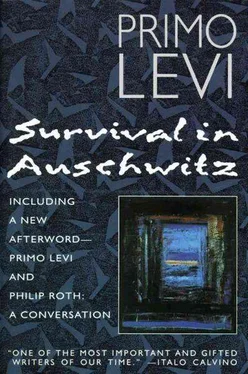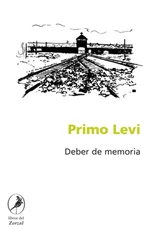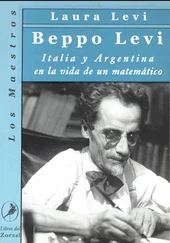He seemed to me inwardly animated more in the manner of some quicksilver little woodland creature enlivened by the forest’s most astute intelligence. Levi is small and slight, though not so delicately built as his unassuming demeanor makes him at first appear, and seemingly as nimble as he must have been at ten. In his body, as in his face, you see—as you don’t in most men—the face and the body of the boy that he was. The alertness is nearly palpable, keenness trembling within like his pilot light.
It is probably not as surprising as one might initially think to find that writers divide like the rest of mankind into two categories: those who listen to you and those who don’t. Levi listens, and with his entire face, a precisely modeled face that, tipped with its white chin beard, looks at sixty-seven both youthfully Pan-like but professorial as well, the face of irrepressible curiosity and of the esteemed dottore. I can believe Faussone when he says to Primo Levi early in The Monkey’s Wrench: “You’re quite a guy, making me tell these stories that, except for you, I’ve never told anybody.” It’s no wonder that people are always telling him things and that everything is recorded faithfully before it is even written down: when listening he is as focused and as still as a chipmunk spying something unknown from atop a stone wall.
In a large, substantial-looking apartment house built a few years before he was bom—indeed the house where he was born, for formerly this was the home of his parents—Levi lives with his wife, Lucia; except for his year in Auschwitz and the adventurous months immediately after his liberation, he has lived in this same apartment all his life. The building, whose bourgeois solidity has begun slightly to give way to time, is on a wide boulevard of apartment buildings that struck me as the Northern Italian counterpart to Manhattan’s West End Avenue: a steady stream of auto and bus traffic, trolley cars speeding by on their tracks, but also a column of big chestnut trees stretching all along the narrow islands at either side of the street, and the green hills bordering the city visible from the intersection. The famous arcades at the commercial heart of the city are an unswerving fifteen-minute walk straight through what Levi has called “the obsessive Turin geometry.”
The Levis’ large apartment is shared, as it has been since the couple met and married after the war, with Primo Levi’s mother. She is ninety-one. Levi’s ninety-five-year-old mother-in-law lives not far away, in the apartment immediately next door lives his twenty-eight-year-old son, a physicist, and a few streets farther on is his thirty-eight-year-old daughter, a botanist. I don’t personally know of another contemporary writer who has voluntarily remained, over so many decades, intimately entangled and in such direct, unbroken contact with his immediate family, his birthplace, his region, the world of his forebears, and, particularly, the local working environment, which, in Turin, the home of Fiat, is largely industrial. Of all the intellectually gifted artists of this century— and Levi’s uniqueness is that he is even more the artist-chemist than the chemist-writer—he may well be the most thoroughly adapted to the totality of the life around him. Perhaps in the case of Primo Levi, a life of communal interconnectedness, along with his masterpiece on Auschwitz, constitutes his profoundly civilized and spirited response to those who did all they could to sever his every sustained connection and tear him and his kind out of history.
In The Periodic Table, beginning with the simplest of sentences a paragraph that describes one of chemistry’s most satisfying processes, Levi writes: “Distilling is beautiful.” What follows is a distillation too, a reduction to essential points of the lively, wide-ranging conversation we conducted, in English, over the course of a long weekend, mostly behind the door of the quiet study off the entrance foyer to the Levis’ apartment. His study is a large, simply furnished room. There is an old flowered sofa and a comfortable easy chair; on the desk is a shrouded word processor; perfectly shelved behind the desk are Levi’s variously colored notebooks; on shelves all around the room are books in Italian, German, and English. The most evocative object is one of the smallest: an unobtrusively hung sketch of a half-destroyed barbed-wire fence at Auschwitz. Displayed more prominently on the walls are playful constructions skillfully twisted into shape by Levi himself out of insulated copper wire—that is, wire coated with the varnish developed for that purpose in his own laboratory. There is a big wire butterfly, a wire owl, a tiny wire bug, and, high on the wall behind the desk, are two of the largest constructions: one the wire figure of a bird-warrior armed with a knitting needle and the other, as Levi explained when I couldn’t make out what the figure was meant to represent, “a man playing his nose,” “A Jew,” I suggested. “Yes, yes,” he said, laughing, “a Jew, of course.”
Roth: In The Periodic Table , your book about “the strong and bitter flavor” of your experience as a chemist, you tell about Giulia, your attractive young colleague in a Milan chemical factory in 1942. Giulia explains your “mania about work” by the fact that in your early twenties you are shy with women and don’t have a girlfriend. But she was mistaken, I think. Your real mania about work derives from something deeper. Work would seem to be your chief subject, not just in The Monkeys Wrench but even in your first book about your incarceration at Auschwitz.
Arbeit Macht Frei —”Work Makes Freedom”—are the words inscribed by the Nazis over the Auschwitz gate. But work in Auschwitz is a horrifying parody of work, useless and senseless— labor as punishment leading to agonizing death. It’s possible to view your entire literary labor as dedicated to restoring to work its humane meaning, reclaiming the word Arbeit from the derisive cynicism with which your Auschwitz employers had disfigured it. Faussone says to you: “Every job I undertake is like a first love.” He enjoys talking about his work almost as much as he enjoys working. Faussone is Man the Worker made truly free through his labors.
Levi: I do not believe that Giulia was wrong in attributing my frenzy for work to my shyness at that time with girls. This shyness, or inhibition, was genuine, painful, and heavy—much more important for me than devotion to work. Work in the Milan factory I described in The Periodic Table was mockwork that I did not trust. The catastrophe of the Italian armistice of 8 September 1943 was already in the air, and it would have been foolish to ignore it by digging oneself into a scientifically meaningless activity.
I have never seriously tried to analyze this shyness of mine, but no doubt Mussolini’s racial laws played an important role. Other Jewish friends suffered from it, some “Aryan” schoolmates jeered at us, saying that circumcision was nothing but castration, and we, at least at an unconscious level, tended to believe it, with the help of our puritanical families. I think that at that time work was for me a sexual compensation rather than a real passion.
However, I am fully aware that after the camp my work, or rather my two kinds of work (chemistry and writing), did play, and still play, an essential role in my life. I am persuaded that normal human beings are biologically built for an activity that is aimed toward a goal and that idleness, or aimless work (like Auschwitz’s Arbeit), gives rise to suffering and to atrophy. In my case, and in the case of my alter ego, Faussone, work is identical with “problem-solving.”
Читать дальше












